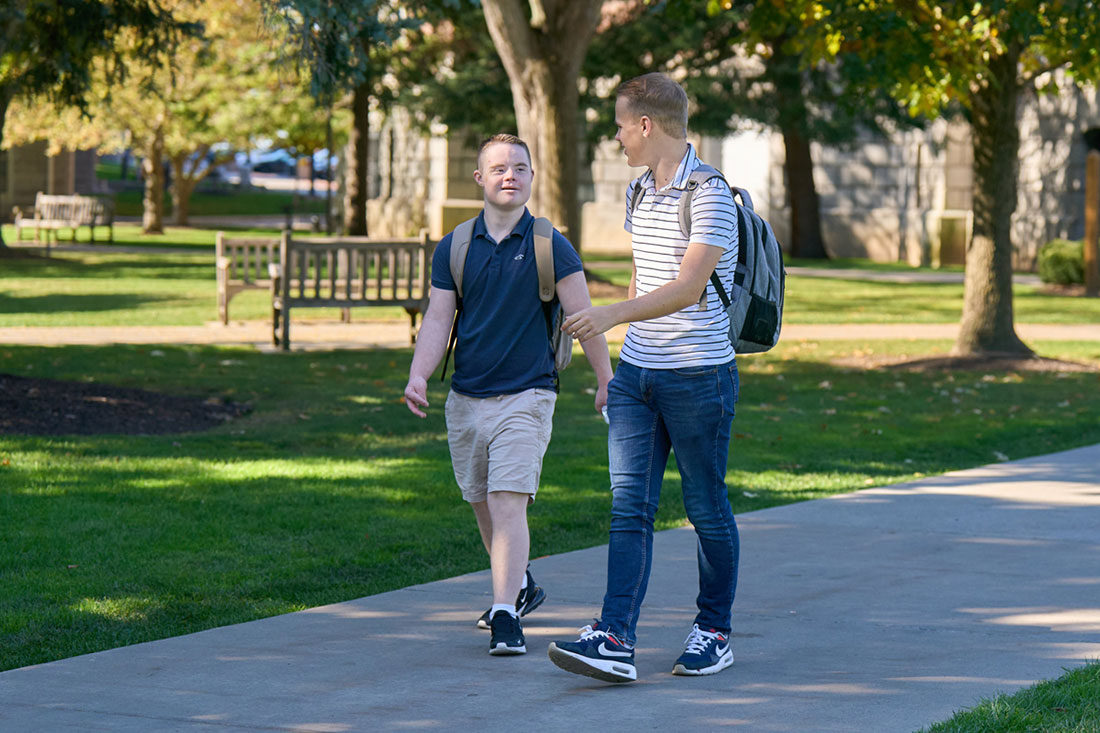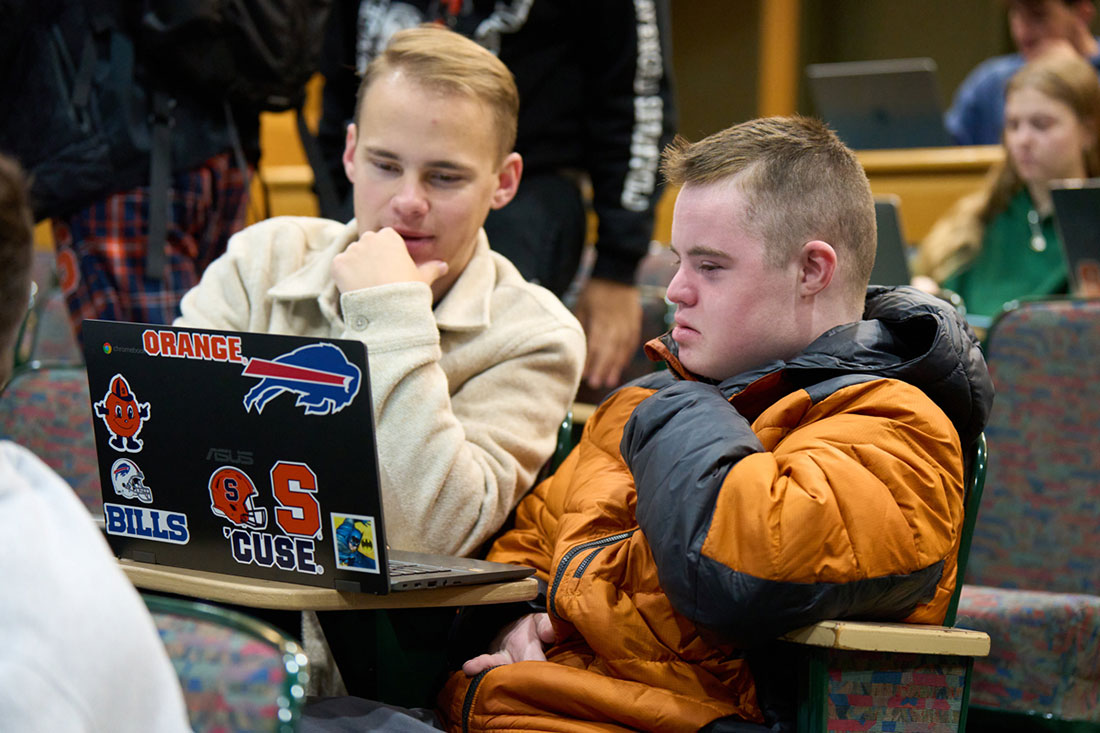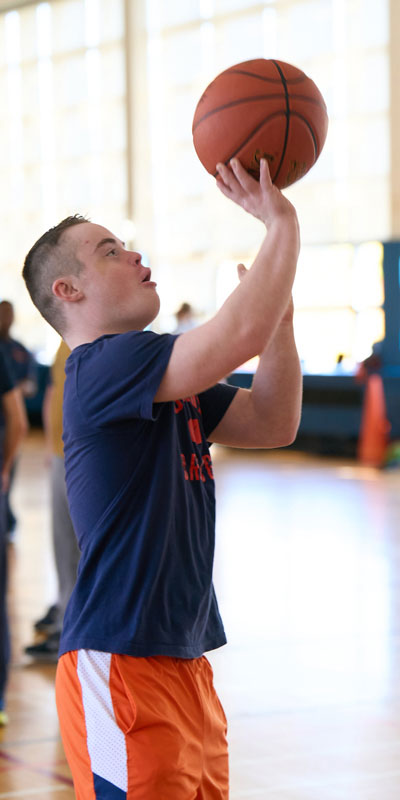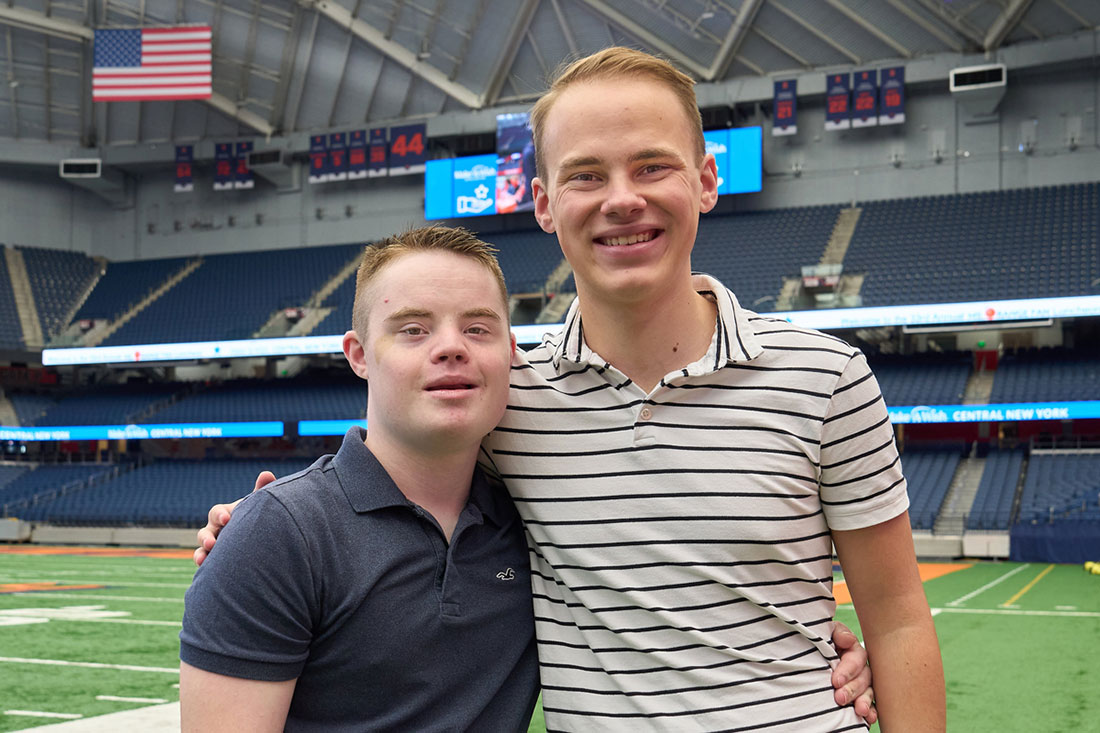
When do children learn empathy? How do they know that someone is in pain or having a bad day?
From an early age, Mark Radel ’28 always demonstrated compassion for his peers. As a precocious 9-year-old, Mark would rush onto the basketball court (accompanied by the coaches) whenever someone got hurt to check in and offer a helping hand.
Luke Radel ’26 says empathy is his brother’s superpower. “Mark is overflowing with empathy, and he has a great ability to know if somebody is having a bad day, and what he can do to help them through it,” Luke says, with a proud smile—and that trait will serve Mark well as he strives for a career in sports and exercise science as an athletic trainer.
Mark’s career ambition is being supported by InclusiveU, an initiative from the Taishoff Center for Inclusive Higher Education that sets a high standard among inclusive higher education programs, making higher education more accessible for people with intellectual and developmental disabilities through individualized and inclusive coursework, student-centered planning, internships, and social and extracurricular activities.
“I want to help people. I’m loving learning about the body, and how what we eat helps make us strong, and when I graduate, I want to work with my football team, the Buffalo Bills, as a trainer,” says Mark, a sports and exercise science major at the University who was born with Down syndrome.
An Unbreakable Bond
Mark’s benevolent spirit helped Luke during his darkest days. While visiting colleges with his family in Boston, Massachusetts, Luke, an aspiring broadcast journalist, was out to dinner when he discovered his voice had left him. Realizing there was a potential health problem, Luke checked into Massachusetts General Hospital for observation.
Within a few hours, the doctors gave Luke their diagnosis: Stage 4 Hodgkin lymphoma. With his head spinning, Luke began undergoing chemotherapy sessions twice a month for six months, oftentimes for five or more hours per visit. What got him through those trying times?
“Mark was by my side, and his compassion was so helpful. Plus, he gives the best hugs. Whenever I was having a bad day, those hugs were just amazing and turned my day around,” says Luke, whose cancer is in remission. “Mark’s had his fair share of health struggles, and in that moment, I realized what Mark overcomes every day just to keep going, all the work he does to go to school and live his life. If he’s taking on that daunting situation every single day, I can take care of my chemotherapy.”
When Luke decided to attend Syracuse University and study both political science in the Maxwell School of Citizenship and Public Affairs and broadcast and digital journalism in the S.I. Newhouse School of Public Communications, Mark decided to follow in his brother’s footsteps, applying to and being granted admission into InclusiveU’s highly competitive program.
Their unbreakable bond was further strengthened as roommates on campus. Luke helps Mark with his homework and with prepping his meals, and configured Mark’s Google Maps app on his phone with the relevant directions needed for Mark to traverse campus on a daily basis.

“Mark is Mr. Independent on campus. He doesn’t want to rely on someone else to help him get across campus. He’s done an amazing job of navigating everything it takes to be a student,” Luke says. “I’m really grateful to be at an institution like Syracuse that is always striving to ensure everybody has access to the opportunities they need to succeed and feel welcome in these spaces.”
Life-Changing Opportunities
From the moment Mark came into his life, Luke has embraced advocating on behalf of his brother, fighting to ensure he was given access to every possible opportunity. It’s part of the Radel family’s genetic makeup. Their father, Patrick, was an attorney who helped people with mental and developmental disabilities be included in their elementary and high school’s educational programs, and their mother, Mary, created a support group, the 21 Club, that raises awareness and educates and connects parents of children born with Down syndrome to resources.
October is Down Syndrome Awareness Month, which, Luke says, is the perfect time for members of the University to learn how people with Down syndrome are valuable contributors to the University community.
“People with Down syndrome are more alike than they are different from us. Mark needs to be in environments that will push him outside of his comfort zone and push the limits of what a person with Down syndrome can accomplish,” Luke says. “You’ll be helping Mark by interacting with him, but you’re also helping yourself gain a better understanding of how people with Down syndrome see and interact with the world around them.
Inspired to become a broadcast journalist from his efforts advocating on Mark’s behalf, Luke has amassed an impressive portfolio as a broadcast journalist, recently covering both the Republican and Democratic national conventions and serving as a multimedia journalist for WKTV in Utica, New York.
Luke hopes to use his dual degrees to continue telling impactful stories that make a difference, including his brother’s inspirational journey to Syracuse University.
“I always wanted to go to college, and being here with my brother has been amazing. This experience has changed my life,” Mark says.

Sports as a Unifying Force
The table tennis area in the lounge of Luke’s off-campus apartment complex is getting quite the workout on a Tuesday morning before they both have class in the Falk College of Sport and Human Dynamics. Good-natured comments fly back and forth whenever a point is scored. Their friendly matches, typically a best two-out-of-three affair, offer insights into their dynamic.
“It’s fun to play sports and I like learning new things while I am playing,” Mark says. “And I like to beat Luke. We always have fun when we play.”
“Oh yeah, this is always fun whenever we play [table tennis]. Mark loves watching and playing sports because it’s exciting and fun for him, and it’s a great way to stay active and also be part of a team and a community. Mark just loves being around people,” Luke adds.
Outside of their sibling showdowns in table tennis, Mark also participates in the Special Olympics Unified Sports club basketball team on campus, practicing every Sunday in the Women’s Building.
Surrounded by friends, Mark takes great pride in his basketball abilities. “It’s fun to shoot, dribble the ball and then pass it to my teammates, but what I’m really good at is shooting and scoring,” Mark says with a smile—but more than his performance, he enjoys the camaraderie and friendships that form with his peers.
“It’s the best. We cheer each other on, cheer for big shots and we all want everyone to play well and have fun,” Mark says. “I play better when my teammates are cheering me on, yelling ‘Mark, Mark, Mark!’ It makes me happy and motivates me.”

An avid fan of the Syracuse University football team, Luke and Mark eagerly await each home game. Mark can often be found yelling and cheering on the team while wearing his No. 6 Syracuse jersey, originally purchased to honor former starting quarterback Garrett Shrader ’23, but this year, the jersey is a nod to current starting quarterback Kyle McCord ’25.
From his seats in the 300 section inside the JMA Wireless Dome, fans flock to Mark’s infectious attitude, exchanging fist bumps and high-fives every time Syracuse comes up with a big play.
“It’s really cool and it makes me feel great to know I’m making new friends while we’re cheering on Syracuse,” Mark says.
“Mark has such a big smile on his face when he’s interacting with our fans, and it makes me so happy to see his joy,” Luke adds.
A Syracuse University News story by John Boccacino originally published on Oct. 21, 2024.
